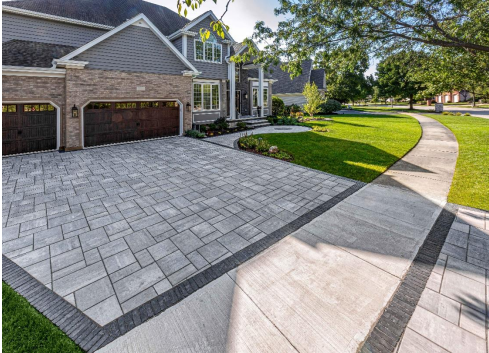
What are the benefits of updating your pavers on your driveway?
Updating your driveway pavers is a fantastic way to enhance the beauty and functionality of your home’s exterior. You can transform your driveway into a stunning focal point by choosing the right design, materials, and installation approach. Don’t underestimate the power of a well-maintained and visually appealing driveway to make a lasting impression. Start planning your paver update project today and elevate your home’s curb appeal to new heights.
Here are some compelling reasons to consider updating your driveway pavers:
- Enhanced Curb Appeal: A well-maintained and visually appealing driveway creates a positive first impression of your home. By updating your pavers, you can transform the look of your driveway, giving it a fresh and updated appearance. This can significantly boost your home’s curb appeal and potentially increase its value.
- Improved Durability: Over time, driveway pavers can wear down, crack, or become uneven due to weather exposure, heavy vehicles, or soil movement. By updating your pavers, you can replace damaged or worn-out pavers with new ones, ensuring a smooth and sturdy surface. This improves the durability and longevity of your driveway.
- Safety and Functionality: Damaged or uneven pavers can pose a safety hazard, leading to trips, slips, or falls. Updating your pavers can create a level and stable surface that reduces the risk of accidents. Additionally, updating your driveway pavers can improve drainage, preventing water pooling and minimizing the chances of ice formation during colder months.
- Customization and Design Flexibility: Updating your pavers allows you to explore different design options and customize the look of your driveway. With a wide range of paver colors, shapes, and patterns available, you can create a unique and personalized driveway that complements your home’s architecture and reflects your style preferences.
- Low Maintenance: Newer paver materials and installation techniques often offer improved durability and require less maintenance. By updating your pavers, you can choose materials that are resistant to stains, fading, and cracking, reducing the need for frequent repairs and upkeep.
Bottom of Form
The best-suited paver material for your driveway depends on several factors, including your budget, climate, desired aesthetics, and personal preferences. Here are some popular paver materials and their characteristics to help you make an informed decision:
- Concrete Pavers: Concrete pavers are a versatile and cost-effective option for driveways. They are durable, available in various colors and shapes, and can mimic the look of natural stone or brick. Concrete pavers are relatively easy to maintain and can withstand heavy loads.
- Brick Pavers: Brick pavers offer a timeless and classic look for driveways. They are known for their durability and ability to handle heavy traffic. Brick pavers have a charming and rustic appearance that can enhance the curb appeal of your property. They may require occasional maintenance, such as resealing, to maintain their longevity.
- Natural Stone Pavers: Natural stone, such as granite, limestone, or travertine, provides a luxurious and high-end look for driveways. These pavers are incredibly durable, resistant to extreme weather conditions, and offer a unique and natural beauty. However, natural stone pavers can be more expensive and require professional installation due to their weight and irregular shapes.
- Interlocking Concrete Pavers: Interlocking concrete pavers are designed to fit together tightly, creating a stable and flexible surface for driveways. They distribute weight evenly, minimizing cracking and allowing for easy repairs if needed. Interlocking concrete pavers come in various colors, shapes, and patterns, providing design flexibility.
- Permeable Pavers: Permeable pavers are an eco-friendly choice that allows water to penetrate through the surface, reducing runoff and promoting groundwater recharge. They are available in various materials, such as concrete or porous asphalt. Permeable pavers require professional installation and can be a suitable option in areas with drainage concerns.
When it comes to choosing the right size and shape of pavers for your driveway design, several factors should be considered. Here are some key points to keep in mind:
- Functionality and Traffic Load: The size and shape of your pavers should be determined by the expected traffic load on your driveway. If you anticipate heavy vehicles or frequent use, larger and thicker pavers may be more suitable to ensure durability and stability.
- Design and Aesthetics: The pavers’ size and shape can greatly impact your driveway’s visual appeal. Consider the architectural style of your home and surrounding landscape when selecting the paver size and shape. Rectangular or square-shaped pavers are commonly used for traditional designs, while irregular shapes or interlocking patterns can create a more contemporary or unique look.
- Installation and Pattern Options: Different paver sizes and shapes offer various installation and pattern possibilities. Smaller pavers can allow for intricate designs, such as herringbone or basketweave patterns, while larger pavers can create a more uniform and streamlined appearance. Consider the level of detail and complexity you desire in your driveway design.
- Ease of Maintenance: The size and shape of the pavers can impact maintenance efforts. Smaller pavers with more joints may require more frequent cleaning and maintenance compared to larger pavers with fewer joints. Consider your willingness and ability to maintain the pavers when making your selection.
- Budget Considerations: Paver size and shape can affect the overall cost of materials and installation. Generally, larger pavers tend to be more expensive than smaller ones. Determine your budget and weigh it against the desired aesthetics and functional requirements.
Maintaining and repairing your paver driveway is crucial for prolonging its lifespan and keeping it in optimal condition. Here are some tips to help you with the maintenance and repair of your paver driveway:
- Regular Cleaning: Regularly clean your paver driveway to remove dirt, debris, and stains. Sweep the surface with a broom or use a leaf blower to keep it free from loose particles. Periodically wash the pavers with a mild detergent and water, using a stiff-bristle brush or a pressure washer on a low setting to remove stubborn stains.
- Weed Control: Prevent weeds from growing between the pavers by applying a weed control product or using a weed barrier fabric during installation. Regularly inspect the driveway for any weed growth and promptly remove them to prevent them from spreading and causing damage to the pavers.
- Sealant Application: Consider applying a sealant to your paver driveway to enhance its durability and protect it from stains, moisture penetration, and fading. Consult with a professional or refer to the manufacturer’s guidelines for the appropriate type of sealant and application method.
- Repairing Damaged Pavers: Inspect your driveway regularly for any damaged or sunken pavers. Replace any cracked, chipped, or broken pavers promptly to prevent further damage and maintain a smooth surface. Ensure the replacement pavers match the existing ones in terms of size, shape, and color.
- Addressing Unevenness: Paver driveways may develop unevenness over time due to soil settling or vehicle traffic. If you notice areas of unevenness or sinking, consider lifting and re-leveling the affected pavers. This can be done by removing the pavers, adding or adjusting the base material, and reinstalling the pavers with proper compaction.
- Proper Drainage: Ensure that your paver driveway has proper drainage to prevent water from pooling and causing damage. Clear any debris or obstructions from the drainage system and ensure that the slope of the driveway allows water to flow away from your home and foundation.
- Avoid Harsh Chemicals: Avoid using harsh chemicals on your paver driveway, such as de-icing salts or strong acids. These substances can damage the pavers and affect their color and integrity. Opt for non-abrasive and pH-neutral cleaning products when maintaining your driveway.
- Professional Maintenance: Consider hiring a professional paver maintenance service for periodic inspections, cleaning, and repairs. They have the expertise and specialized equipment to ensure your driveway receives the proper care it needs.
.



